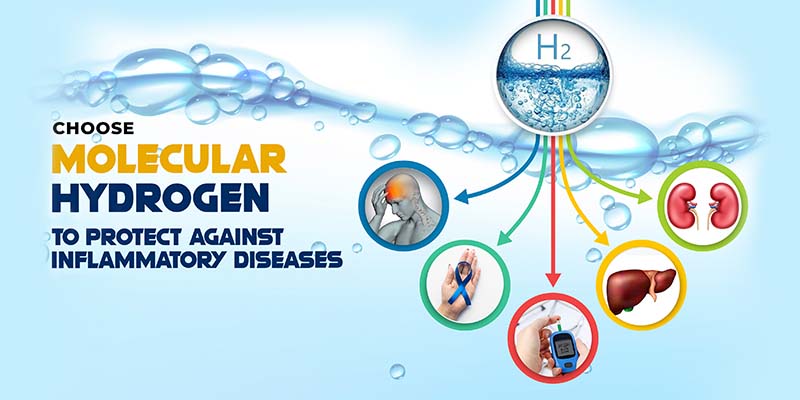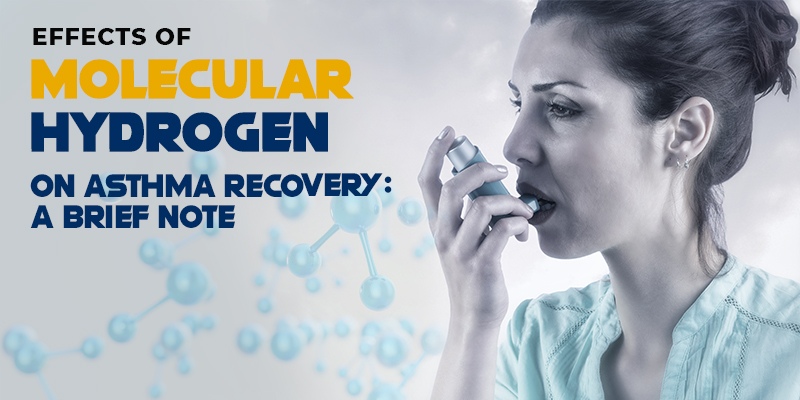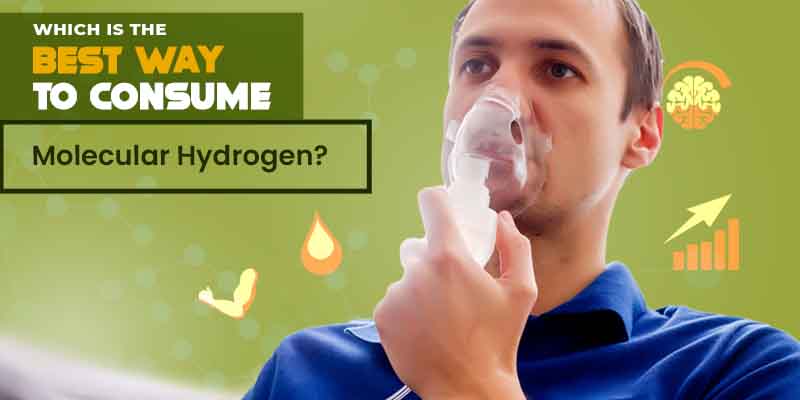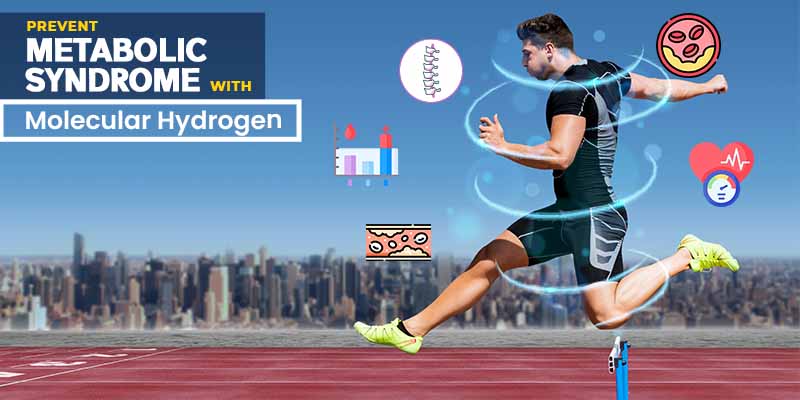India has 34.3 million asthmatics. This figure is approximately 12.9% of the global 262 million cases. Most of these people often do not receive the right medication, nor is their condition managed properly.
While there is no permanent cure for asthma, there are medicines available that need to be used lifelong. However, if one understands the condition properly, one can see that there are benefits to alternative therapies for the asthmatic condition.
One of the alternative therapies that have considerable backing in the research literature is molecular hydrogen inhalation therapy. It’s a novel therapeutic agent for various pulmonary diseases including asthma.
In today’s blog, we will take a look at the effects of molecular hydrogen on asthma recovery. To make use of molecular hydrogen you will need a hydrogen generator. Eliteck Hydrogen is one of India’s leading producers of an electrolyzer that safely produces hydrogen for consumption.
Delve into the details of how hydrogen can be an answer to the growing problem of asthma in India and other countries.
What Is Asthma? Understanding the Background of This Condition 1
Asthma is a chronic inflammatory disease of the airways of the lungs. It is induced by exposure to environmental triggers (e.g. cigarette smoke, dander, pollen, exercise, etc.).
Asthma is characterized by the following features:
- Airway inflammation
The inner lining of the airways swells up and produces mucus.
- Airway hyperresponsiveness (AHR)
AHR is a condition that asthma patients show where the airways narrow excessively in response to stimuli (pollens, allergens, pet dander, etc.) that produce little or no effect in healthy persons. 2
- Elevated immunoglobulin (Ig) E level
Found only in mammals, this is a type of antibody (a protein that fights germs) produced by the body. High signs of (Ig) E level indicates some kind of allergy in the body.
- Airway remodeling
In asthma, there may be changes in the structure of the bronchial walls.
Symptoms of Asthma
The common symptoms of the asthmatic condition are:
- Wheezing
- Shortness of breath
- Chest tightness
- Cough
- Restricted airflow
Cause of Asthma3 ,4, 5
The cause of asthma has its foundation in genetics and the immune responses of the body.
Firstly, there exists a trigger that can be allergic (e.g. house mites, cockroach residue, animal dander, mould, and pollens) or non-allergic (e.g. viral infection, cigarette smoke, cold air, exercise) which starts off the asthmatic reaction.
Any of the above triggers when breathed in set into motion the immune response of the body producing a cascade of events that leads to the inflammation of the airways.
Genetics plays a big role in this entire inflammatory cell production process.
Moreover, there is evidence that reactive oxygen and nitrogen species also play a major role in the inflammation of airways.
It is here that hydrogen inhalation therapy comes in as a potential cure. Let’s understand the role hydrogen plays in this problem.
Please find the diagrammatic representation of Asthma pathophysiology as depicted in Fig. 1 (taken from https://www.ncbi.nlm.nih.gov/pmc/articles/PMC3488912/)
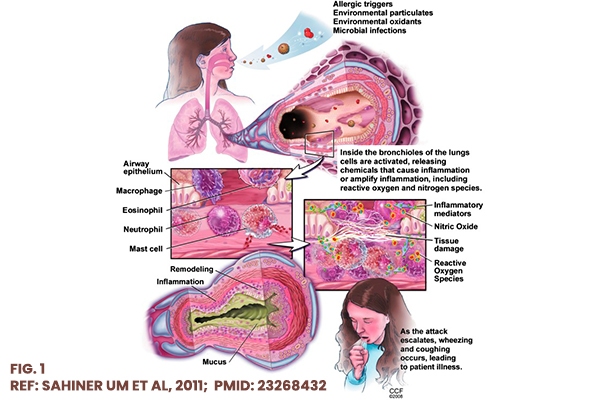
How Does Hydrogen Inhalation Therapy Help Those With Asthma?6
Molecular hydrogen helps to reduce oxidative stress and inflammation. Take a look at the detailed effects of this element.
1.Hydrogen can lower the severity of inflammation and oxidative stress
Reactive Oxygen Species (ROS) play a major role in airway inflammation and determine the severity of the asthma condition. Hydrogen plays a crucial role in reducing inflammatory factors. (Zhang N et al., 2018)
2.Hydrogen also helps to reduce airway hyperresponsiveness
Inhaling hydrogen has been shown to reduce airway hyperresponsiveness. (Huang et al., 2019). It also decreases the (Ig) E levels.
3.Defective phagocytosis is reversed
Alveolar macrophages (a type of white blood cells) maintain a clear airway free of bacteria and foreign particles. However, in asthma, they lose their ability to remove foreign particles. Hydrogen gas inhalation tends to reverse this defect in the cells, improving their ability to remove foreign particles (Huang et al., 2019).
4.Hydrogen reduces airway remodeling
Hydrogen helps to reduce airway remodeling, which leads to improved lung function. (Fehrenbach et al., 2017).
Effectively, molecular hydrogen tackles the four conditions typical of asthma. The results from the above studies help us to draw a conclusion that molecular hydrogen is an effective therapeutic agent for asthma.
Important Features of Eliteck Hydrogen’s Elicare Electrolyzer
Given the benefits of molecular hydrogen, you may be interested in a product that safely produces the gas for consumption. We have just the ANSWER!
Here are some of the more notable features of our electrolyzer.
- It’s a patented product with patent number 201831023702 applied on 26/06/2018.
- We are the original manufacturer and the product is made entirely in India.
- The machine is scientifically tested and has completed Phase II trial.
- It does not store hydrogen so there is no chance of explosion.
- The product follows all safety precautions and measures.
Conclusion
Molecular hydrogen is a therapeutic agent for managing asthma conditions. Inhaling this product regulates oxidative stress, inflammation, and the aging process. Also, there exists a protective effect in various lung diseases. Further, there is expected to be large-scale human trials to confirm the efficacy of hydrogen as a therapeutic product.
What was once viewed as a futuristic therapy, is now going to become the norm. So, choose to invest in a hydrogen generator today!
References Papers:
1 . https://bmcpulmmed.biomedcentral.com/articles/10.1186/s12890-019-1001-9#:~:text=Ovalbumin%20(OVA)%2Dsensitized%20and,features%20observed%20in%20human%20asthma.
Comparison of asthma phenotypes in OVA-induced mice challenged via inhaled and intranasal routes
Dong Im Kim, Mi-Kyung Song & Kyuhong Lee
2 .https://www.ncbi.nlm.nih.gov/pmc/articles/PMC4386586/#:~:text=Airway%20hyperresponsiveness%20(AHR)%20is%20defined,healthy%20subjects%20(Figure%201).
Mechanisms of Airway Hyperresponsiveness in Asthma: The Past, Present and Yet to Come
David G. Chapman and Charles G. Irvin
PMCID: PMC4386586 NIHMSID: NIHMS669380 PMID: 25651937 doi: 10.1111/cea.12506
3. https://www.ncbi.nlm.nih.gov/pmc/articles/PMC3488912/
Oxidative Stress in Asthma
Umit M Sahiner, MD, Esra Birben, PhD, Serpil Erzurum, MD, Cansin Sackesen, MD, and Omer Kalayci, MD
PMCID: PMC3488912 PMID: 23268432 doi: 10.1097/WOX.0b013e318232389e
4. https://www.ncbi.nlm.nih.gov/pmc/articles/PMC6157154/
Asthma
Jaclyn Quirt, Kyla J. Hildebrand, Jorge Mazza,Francisco Noya, and Harold Kim
PMCID: PMC6157154 PMID: 30275843 doi: 10.1186/s13223-018-0279-0
5. https://www.ncbi.nlm.nih.gov/pmc/articles/PMC3075501/#:~:text=The%20T%20helper%20type%202,as%20asthma%20and%20allergic%20diarrhoea.
Type 2 innate immune responses and the natural helper cell
Shigeo Koyasu and Kazuyo Moro
PMCID: PMC3075501 PMID: 21323663 doi: 10.1111/j.1365-2567.2011.03413.x
6. https://pubmed.ncbi.nlm.nih.gov/35187885/
Molecular hydrogen is a promising therapeutic agent for pulmonary disease
Zhiling Fu, Jin Zhang
PMID: 35187885 PMCID: PMC8861563 DOI: 10.1631/jzus.B2100420
